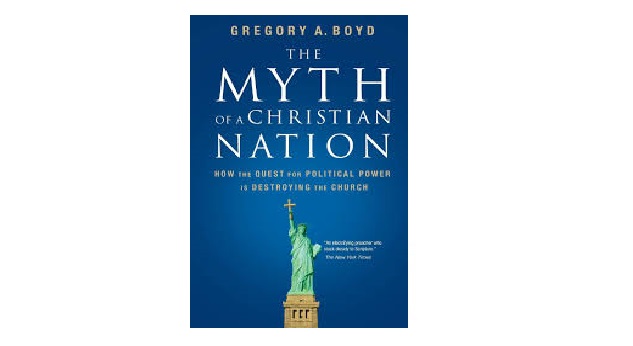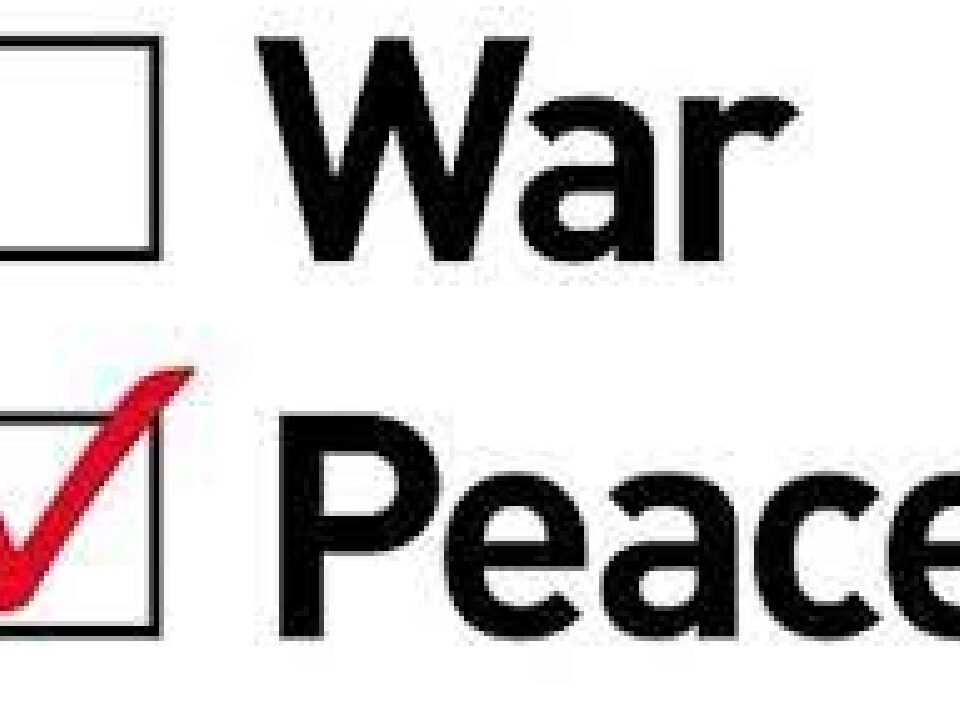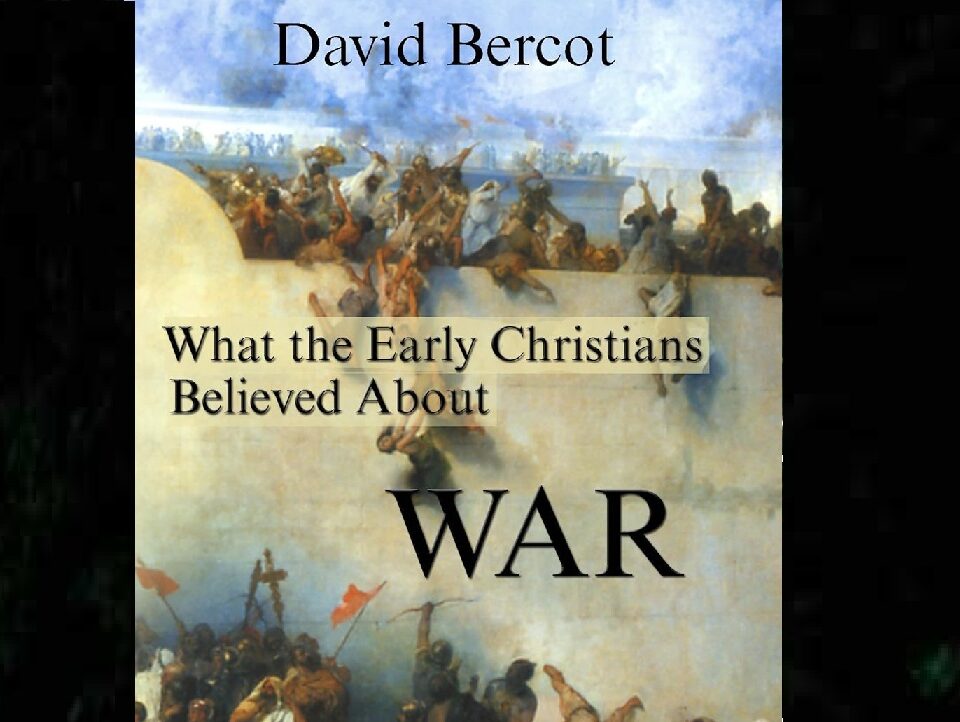From The Myth of a Christian Nation.
Shortly after the Gulf War in 1992 I happened to visit a July Fourth worship service at a certain megachurch. At center stage in this auditorium stood a large cross next to an equally large American flag. The congregation sang some praise choruses mixed with such patriotic hymns as “God Bless America.” The climax of the service centered on a video of a well-known Christian military general giving a and almost “casualty-free” victory “he gave us” in the Gulf War (Iraqi deaths apparently weren’t counted as “casualties” worthy of notice). Triumphant military music played in the background as he spoke.
The video closed with a scene of a silhouette of three crosses on a hill with an American flag waving in the background. Majestic, patriotic music now thundered. Suddenly, four fighter jets appeared on the horizon, flew over the crosses, and then split apart. As they roared over the camera, the words “God Bless America” appeared on the screen in front of the crosses.
The congregation responded with roaring applause, catcalls, and a standing ovation. I saw several people wiping tears from their eyes. Indeed, as I remained frozen in my seat, I grew teary-eyed as well—but for entirely different reasons. I was struck with horrified grief.
Thoughts raced through my mind: How could the cross and the sword have been so thoroughly fused without anyone seeming to notice? How could Jesus’ self-sacrificial death be linked with flying killing machines? How could Calvary be associated with bombs and missiles? How could Jesus’ people applaud tragic violence, regardless of why it happened and regardless of how they might benefit from its outcome? How could the kingdom of God be reduced to this sort of violent, nationalistic tribalism? Has the church progressed at all since the Crusades?
Indeed, I wondered how this tribalistic, militaristic, religious celebration was any different from the one I had recently witnessed on television carried out by Taliban Muslims raising their guns as they joyfully praised Allah for the victories they believed “he had given them” in Afghanistan?
Now, perhaps one could respond to my many questions by insisting that the Gulf War, unlike the war carried out by the Taliban, was a “just war.” After all, the Kuwaiti people were losing their freedom and there were reports of women being raped.
Perhaps it was; perhaps it wasn’t. People still debate this. But as kingdom-of-God citizens who are to always have a healthy suspicion toward every version of the kingdom of the world, especially our own, we have to at least ask the question why the loss of freedom to the Kuwaiti people mattered so much to our government while the loss of freedom to millions of others around the globe does not? For example, less than two years after the Gulf War, nearly a million Rwandans were barbarically massacred in a three-month period. Though the American government and other Western governments possessed detailed information about the genocide as it was unfolding, we did nothing. A similar question could be raised, comparing our war for “Iraqi freedom” with our reluctance to get involved militarily in the Sudan, where atrocities—far worse and on a larger scale than those perpetrated by Saddam Hussein—have been carried out routinely.
Of course, the reasons why we go to war in Kuwait and Iraq but do little to help Rwanda or the Sudan are complex. Kingdom-of-the-world issues almost always are, especially when they pertain to international relations. But for kingdom-of-God citizens who are aware of the idolatrous self-centeredness of rebellious hearts and the universal influence of Satan, and who thus know better than to place undue trust in any version of the kingdom of the world, don’t these inconsistencies at least call into question the claim that we as a nation operate with purely altruistic motives? Don’t these inconsistencies suggest that where a group is located and what their resources are (like oil) are at least one factor in whether a people’s freedom is worth risking American lives for? In other words, doesn’t it suggest that, like every other version of the kingdom of the world, America looks out primarily for its own self-interest? And shouldn’t this curb our confidence that God is always on our side and shares our excitement over “winning”?[1]
My goal in raising these questions is not to critique America. To the contrary, this is the way all versions of the kingdom of the world operate. My critique is rather toward the American church. We expect nations to be driven by self-interest, but we shouldn’t expect kingdom people to applaud this fact, especially when the national self-interest involves taking lives! Isn’t our central calling as kingdom people to manifest the truth that this old, self-centered, tribalistic, violent way of living has been done away in Christ? Are we not to display the truth that in Christ a new humanity has been created, one in which there are no ethnic, nationalistic, gender, social, or economic distinctions (Eph. 2:13–17; Gal. 3:26–29)? Aren’t we called to “live by the Spirit” and thus put away all “works of the flesh”—including aligning ourselves with various sides of “dissensions [and] factions” (Gal. 5:16–20)?
Whether one thinks the Gulf War was just or not (or whether
one thinks this question is even relevant for disciples of Jesus), how can
kingdom people not grieve the loss of Iraqi lives as much as the loss of
American lives? Didn’t Jesus die for Iraqis as much as for Americans? Don’t
they possess the same unsurpassable worth that Americans possess? Are we not to
embody and manifest Christ’s Calvary-quality love even for our nation’s worst
enemies? When a congregation, gathered in the name of the crucified Nazarene,
applauds the violent conquest of fighter jets flying over his cross, is this
not further evidence of the diabolic power of the sword to blind us?
[1] The claim to having purely altruistic and righteous America as God’s new Israel and the righteous “city set on a hill.” For a comprehensive historic analysis and insightful critique, see Jewett and Lawrence, Captain America and the Crusade against Evil as well as Hughs, Myths America Lives By, esp. chap. 6.




